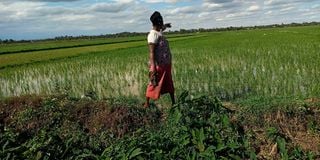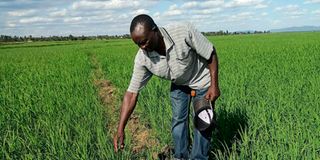Premium
Call to arms as rodents ‘from Asia’ ravage rice farms in Mwea

Agnes Wangithi, a rice farmer at Unit 20 in Tebere Ward, Mwea East sub-County points towards some farms affected by invasive rodents.
What you need to know:
- The rodents have left families staring at an uncertain future.
- The rodents are of different species, some black with long mouths.
As one approaches Mwea, the aroma of freshly milled Pishori rice hits the nose as eyes gaze over acres of paddy.
Deep in the villages, however, are tales of agony as rice farmers battle rodents. The town owes its reputation to the toil of rice farmers in Mwea Constituency, Kirinyaga County.
The rodents have left families staring at an uncertain future, with impending losses running into millions of shillings.
We encounter distraught farmers in Tebere village, Mwea East sub-county. James Gachoki is one such farmer. He is tending to his four paddies, each an acre, with the crop almost mature.
Gachoki has grown rice for more than three decades but 2024 is a year to forget.
He says rodents have been destroying seedlings in nurseries and maturing rice. The animals attack the farms at night.
“We don’t know where these rodents came from. A hole can have more than 1,000. They were first spotted in December 2023 but their numbers have grown exponentially,” Gachoki says.
The rodents are of different species, some are black with long mouths, others with lines on their skin and some are purple.
The rodents also make holes that drain water from farms. Gachoki says farmers have been using meat, bread, ugali and ready rice laced with insecticides to battle the rodents but the method is not effective.

James Gachoki tends to his rice farm at Unit 20 in Tebere Ward, Mwea East sub-County.
“Few farmers had good yields in the last season. We are not sure if these animals will spare our crop. A farmer could get an average of 25 90-kilo sacks of rice per acre but that is no longer the case,” he says.
Next to Gachoki’s farm is Agnes Wangithi’s. She says preparing an acre of rice takes resources as one has to buy seedlings and tend to the crop until it matures.
“These animals are reducing us to beggars,” she says.
Wangithi says the animals invaded her farm when the crop was in the last stage of maturity.
“I planted rice in August but I’m worried the rodents will be here as November approaches when they sense that the crop is maturing,” she says, adding that the animals have learnt to neutralise pesticides by taking water.
“We don’t even have enough seedlings to replace the ones destroyed. The rodents are worse than birds,” she says.
Senate Agriculture Committee chairman James Kamau Murango says the biggest challenge rice farmers in Mwea face is controlling the rodents.
According to the Kirinyaga senator, farmers in the irrigation scheme have fought Quelea quelea birds for years, but the rodents pose a greater danger. He says some of the rodents can be traced to Asia.
“This could be sabotage by cartels that want the production of rice to fall. They will then import rice cheaply and sell exorbitantly. How did the snails and rats arrive from Asia?” he asks.
He says the rodents eat seedlings valued at Sh36,000 every night. With the Ministry of Agriculture yet to provide pesticides to control the rodents, farmers have resorted to a cheap and dangerous insecticide sourced from a neighbouring country.
“The pesticide is carcinogenic as it contains acetamiprid and neonicotinoids. These two chemicals have been blamed for breast cancer,” the senator says.
“The government must address this problem urgently before the country becomes rice insecure.”
Joel “Mkombozi” Kariuki, one of the directors of Nice Rice Millers Ltd – a private mill with a chain of more than 500 farmers – says supply has not been encouraging in recent months.
“The animals start by invading nurseries before turning to the farms. Farmers are left with nothing to transplant. This affects yields. Farmers and millers are incurring losses,” Kariuki says.
“When the farmers suffer, I suffer too as there is little to process. The yields per acre have dropped to 17 bags and below.”
He urges the government to send experts to Mwea and come up with proper pest-control methods.





